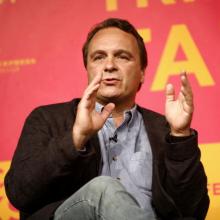Foreign Policy
The two major streams of Christian engagement on war are pacifism and just war theory, which comes out of Catholic social teaching. The pacifist response to Syria strikes is clearly opposed. As for the just war analysis, it takes a little explaining, but reaches the same conclusion.
Conservative Christians in particular cheered [Trump's] nomination of Neil Gorsuch to the Supreme Court, and his promised “fix” for the Johnson Amendment, which restricts pastors' ability to politick in the pulpit.
But, for the second time since his inauguration, Trump has decided to retain an Obama-era initiative to protect sexual minorities.
Republican South Carolina Gov. Nikki Haley will be a rare woman on Donald Trump’s Cabinet-level team, and one of the few persons of color.
Knowing little about her foreign policy positions, given that she has little to no international experience, what should we expect from Haley once she is confirmed to be ambassador to the United Nations?
Donald Trump’s pick for secretary of state, ExxonMobil CEO Rex Tillerson, has come under fire for his friendship with Russian president Vladimir Putin – who is suspected of trying to tip the election to Trump – his lack of diplomatic experience, and the fact that he is a corporate bigwig who champions fossil fuels, even as the threat of global warming grows.
But Tillerson, whose nomination was announced on Dec. 13, may also face criticism from an unexpected quarter – social conservatives whose support was critical to Trump’s unexpected election last month.
1. Why White People Don’t Use White Emoji
Light-skin-tone symbols are used far less often in the U.S. than their darker counterparts. Does shame explain the disparity?
2. The Aspiring Novelist Who Became Obama’s Foreign Policy Guru
“People construct their own sense of source and credibility now. They elect who they’re going to believe.” The untold story of the wannabe-fiction writer who became President Obama’s mouthpiece to the world.

iamshutter / Shutterstock
ADD LIBYA TO the growing list of countries where the United States is conducting military operations in the name of fighting terrorism.
In February, a U.S. airstrike in the town of Sabratha in western Libya killed more than 40 people. The intended target was said to be Noureddine Chouchane, a senior commander of the so-called Islamic State (ISIS) from nearby Tunisia, but there has been no independent confirmation that he was at the site. Among those killed in the attack were two Serbian embassy staff who were being held hostage by ISIS.
Since the overthrow of the Gadhafi regime in 2011, Libya has been engulfed by chaos. There are now two competing governments—one in the eastern city of Tobruk (recognized by the United Nations) and the other in Tripoli—neither with much power or public support. Real power in the country is in the hands of hundreds of militia groups that rule local areas and often support rival government factions. Many of the militias oppose the presence of foreign forces, and the Tripoli-based government vigorously criticized the U.S. attack on Sabratha.
Pentagon commanders believe that bombing and commando operations can reduce the terrorist threat in Libya, but the experience of military intervention in other countries during the past 14 years suggests otherwise. U.S. military attacks have not brought stability and peace to Afghanistan, Iraq, Yemen, Somalia, or Syria. Why do we think they will solve the problems now in Libya?
The United States fought a major war in Iraq to suppress al Qaeda, but that organization morphed into the even-more-dangerous menace of ISIS. The U.S. has conducted more than 10,000 military strikes against extremist targets in Syria and Iraq during the past 18 months, but the threat from ISIS in the region remains formidable and is now spreading to Libya.
[A] POPULAR consensus is forming around the fact that new world realities demand fresh policies, beyond militarism. Public opinion is increasingly sophisticated about military and foreign policy issues. This is in large part due to the efforts of the peace movement.
A significant share of the peace movement's task is to promote political literacy in our own country. Every town meeting organized, every opportunity arranged for people to make their own judgments and come to their own decisions about U.S. foreign and military policy is an investment in future social and political change. As people are confronted with these moments of decision, they are given the information, the tools, the sense of their own power to determine the shape of national security policies.
IN THE PRESIDENTIAL election in Honduras last November, ruling party candidate Juan Orlando Hernández was declared the winner despite serious irregularities documented by international observers. Violence and intimidation marked the campaign period, including the assassination of at least 18 candidates and activists from Libre, the new left-leaning party.
Hernández, past president of the Honduran National Congress, supported the June 2009 coup. His record of operating outside the rule of law includes bold measures to gain control over the congress, judiciary, military, and electoral authority. He helped establish a new military police force in August 2013, deploying thousands of troops to take over police functions. Hernández ran on a campaign promise to put “a soldier on every corner.”
Honduras has been named the “murder capital of the world,” with relentless violence coming from crime, drug cartels, and police corruption. Attacks on human rights defenders and opposition activists have been brutal and have allegedly involved death squads reminiscent of the 1980s. Those working to reverse poverty and injustice receive death threats, priests and lay leaders among them. They are bracing for even greater repression under Hernández’s administration.
The growing militarization of Honduran society, justified as a way of fighting crime, is fueled by U.S. support for the country’s security forces—forces reportedly involved in widespread human rights violations. By denying the repression against social movements, and congratulating the Honduran government for its supposed progress on human rights, the U.S. Embassy has made it possible for rampant impunity to continue.
“GOD CREATED the world and we created borders.”
That obvious recognition was shared at a recent consultation in Quito, Ecuador, between North American and Latin American churches on “Faith, Economy, and Migration.” Felipe Adolf, president of the Latin American Council of Churches, shared that conclusion on how issues of migration and reform are global and not just local.
It’s very easy to see the problems confronting our nation and feel as though the challenges facing the rest of the world are simply too much to bear. Continuing poverty and unemployment, discrimination of all kinds, and wars and rumors of wars fill our newsfeeds, papers, and TV screens. But it’s naïve and narrow to think this way. Many of the threats we face are global in nature and don’t know any boundaries. Through our economies and consumption habits, media, travels and migrations, and for Christians in particular our faith, we are inextricably connected with men and women around the world. It’s always been important, but now especially so, to think globally when it comes to faith and justice.
Sojourners has a long history of doing this very thing. We started as a little group of two kinds of people—those who had grown up conservative evangelicals and were deeply frustrated with the lack of attention to issues of justice and peace, and those who had just come to faith from the student movements and counterculture of the 1960s and ’70s. We met at Trinity Evangelical Divinity School and began to study and pray through the scriptures about injustice, war, and poverty. The Vietnam War was raging, and we were looking for a biblical understanding of the events of our time.
One of the most fresh and challenging interpretations surrounding the Christmas narrative was produced by South Africa’s renowned theologian, the late Steve de Gruchy. In regards to the Magi and their visit with Joseph, Mary, and the newly born Jesus in Matthew 2: 1-12, de Gruchy offers a striking proposal surrounding the biblical text and its direct relationship with cooperative efforts between those in the so-called global north and south.
...
Among other things, a key insight into this portion of the Christmas narrative is that God is revealed through the vulnerability of poverty and marginalization. The main characters of the Christmas plot are not wealthy and prosperous high-rollers, but the downtrodden and vulnerable poor who stand as deliberate reminders of how God is in solidarity with those who are too often forgotten and oppressed. If Mary and Joseph were people of wealth and privilege, they surely would have received room at the inn, yet God shows an alternative to the common hierarchies of status in our world, and such pushed-aside people are given highest priority as the bearers of Christ.
Just peace theory begins with the idea that peacemaking, peacekeeping, and peace building is a day-by-blessed-day proposition. Unlike just war theory, it does not begin when violent conflict is imminent. There are 10 just peacemaking practices that have a record of success. A just peace foreign policy employs these practices for the purposes of both national security and of international peace.
The 10 just peacemaking practices are: support nonviolent direct action; take independent initiatives to reduce threat; use cooperative conflict resolution; acknowledge responsibility for conflict and injustice, and seek repentance and forgiveness; advance democracy, human rights, and interdependence; foster just and sustainable economic development; work with emerging cooperative forces in the international system; strengthen the United Nations and international efforts for cooperation and human rights; reduce offensive weapons and weapons trade; encourage grassroots peacemaking groups and voluntary association. (Just Peacemaking: the new paradigm for the ethics of peace and war Glen H. Stassen editor)
Cooperation, interdependence, human rights, and democracy are important elements of just peacemaking practices. I say this is a power-with, not a power-over model of foreign policy. This is not a model of weakness, but one of strength. The strength comes from building relationships and partnerships with other nations on the basis of mutual respect.
The most recent discussions of U.S. foreign policy and the Middle East, once again say more about politics during an election year, than they do about the fundamental issues we must confront if we want to see substantial change.
So let’s look at the basic issues and fundamental choices we need to make.
Today the Middle East — where about 60 percent of the population is under the age of 25 — is a region dominated by humiliation and anger.
Failure + rage + the folly of youth = an incendiary mix.
The roots of anti-American hostilities in the Middle East run deep (literally and figuratively). We can start with the fact that our oil (and its economy) lies beneath their sands. Couple that with U.S. support of repressive and backward regimes, the continual presence of foreign troops on their land and in their holy places, and the endless wars waged there, ultimately fueled by the geopolitics of energy.
Add to that incindiary cocktail the unresolved Israeli/Palestinian conflict, which continues to drive the deepest emotions of mutual frustration, fear, and retaliation throughout the Middle East and the rest of the world.
Injustices and violence caused by the oil economy have sparked a reaction from dangerous religious fundamentalists in the Islamic world. Fundamentalism — in all our faith traditions — is both volatile and hard to contain once it has been unleashed, and it becomes hard to reverse its essentially reactive and predictably downward cycle.
Yale Professor David Bromwich analyses President Obama's foreign policy for The Huffington Post:
A recent Gallup poll shows that 81 percent of Americans want the President to be focused on domestic issues, while 9 percent say they want him to focus on foreign policy issues. Not too surprising ... until you consider that the fastest growing domestic priority is the deficit (69 percent).
The lopsided number between the importance of the deficit and the importance of foreign policy is the first clue that, for most Americans, there’s a disconnect between domestic policy and foreign policy.
Clue number two is a bit more alarming.
The same poll indicates that 54 percent favor a “strong” stance — read: military attack — against Iran versus 39 percent who say that it’s more important to avoid a military conflict with Iran. Put these facts together and a disturbing picture emerges: the less Americans care about foreign policy, the more willing they are to go to war, and the less they’re able to see that war = skyrocketing deficits.
The disconnect couldn’t come at a worse time.

Rare red pandas, wrestling in the snow. Image via Wiki Commons http://bit.ly/xcpR67
Having critics isn’t a bad thing. Sometimes they serve as a sort of public accountability. Other times, they express questions that others might be asking but haven’t voiced.
Marvin Olasky, editor in chief of World Magazine, came out with a quick critique of Sojourners’ press release celebrating the Obama Administration’s decision to reject the current plans for building the Keystone XL pipeline. His post offers an excellent opportunity to address a few things that others might have been wondering as well.
His headline? “Sojourners and Keystone: Using the Bible for Political Purposes.”

GOP Presidential Candidates, image by DonkeyHotey via Wylio (http://bit.ly/uvSrqj)
Another week, another Republican Presidential Debate.
This time, eight of the GOP candidates for the nomination spent their evening putting forward their beliefs on the issues of foreign policy and national security. The topics ‘debated’ (out of respect for Debate teams around the country, I use inverted commas) were not surprising – Afghanistan, Iran, the Arab Spring, Israel, foreign aid, immigration.
But there were a few things that the candidates did say that caught my attention as I read through the transcript this morning – particularly in relation to foreign aid and immigration.
It was encouraging to hear at least one candidate come out and support the positive impact and geo-strategic importance that non-military development assistance is playing on the African continent (even if he did accidentally call Africa a "country.")
Is The Bible A Reliable Moral Guide?; Why I Got Arrested At Occupy Wall Street; Unemployment Rates Drop In Most States;Black Friday And The Importance Of Sabbath Rest; Poor People To Get Poorer; Coptic Christians Living In Egypt Speak Out (VIDEO); Wall Street Will Never Be The Same Again; Occupy Wall Street And The Crisis Of Choice (OPINION); Candidates Face Foreign Policy Challenge; Don't Surrender To Laws Of Market, Pope SaysOut To Lunch: Congress Puts The Food Lobby Above Child Nutrition; Supercommittee Failure Puts U.S. At Risk (OPINION); Would The World Be Better Off Without Religion? (AUDIO); 'Thanksgiving To Almighty God' Presidential Thanksgiving Proclamations From George Washington To Barack Obama.
“Oh my God” was the refrain that kept going through my mind as I watched the Republican presidential candidates talk about their positions on foreign policy at their debate over the weekend.
I did not expect the surprises that I heard. At least two candidates supported torture, saying it was necessary to acquire acquire information to protect America.
Oh my God.












